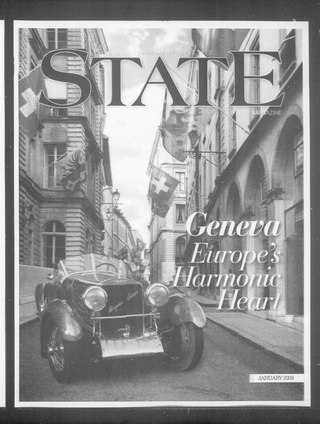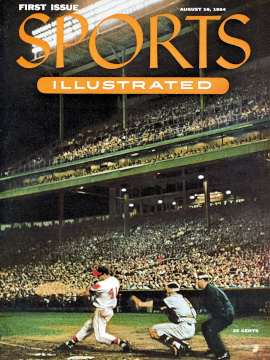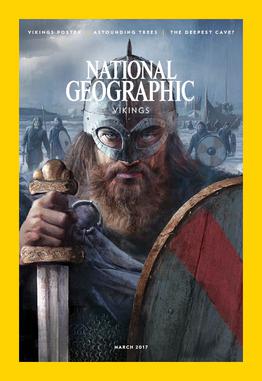
A magazine is a periodical publication, generally published on a regular schedule, containing a variety of content. They are generally financed by advertising, purchase price, prepaid subscriptions, or by a combination of the three.

The Times is a British daily national newspaper based in London. It began in 1785 under the title The Daily Universal Register, adopting its modern name on 1 January 1788. The Times and its sister paper The Sunday Times, are published by Times Media, since 1981 a subsidiary of News UK, in turn wholly owned by News Corp. The Times and The Sunday Times, which do not share editorial staff, were founded independently and have had common ownership only since 1966. In general, the political position of The Times is considered to be centre-right.

The history of British newspapers begins in the 17th century with the emergence of regular publications covering news and gossip. The relaxation of government censorship in the late 17th century led to a rise in publications, which in turn led to an increase in regulation throughout the 18th century. The Times began publication in 1785 and became the leading newspaper of the early 19th century, before the lifting of taxes on newspapers and technological innovations led to a boom in newspaper publishing in the late 19th century. Mass education and increasing affluence led to new papers such as the Daily Mail emerging at the end of the 19th century, aimed at lower middle-class readers.

The Economist is a weekly newspaper published in printed magazine format and digitally. It focuses on current affairs, international business, politics, technology, and culture, and is mostly written and edited in Britain. Based in London, the newspaper is owned by the Economist Group, with its core editorial offices in the United States, as well as across major cities in continental Europe, Asia, and the Middle East. The newspaper has a prominent focus on data journalism and interpretive analysis over original reporting, to both criticism and acclaim.

Sports Illustrated (SI) is an American sports magazine first published in August 1954. Founded by Stuart Scheftel, it was the first magazine with a circulation of over one million to win the National Magazine Award for General Excellence twice. It is also known for its annual swimsuit issue, which has been published since 1964, and has spawned other complementary media works and products.

National Geographic is an American monthly magazine published by National Geographic Partners. The magazine was founded in 1888 as a scholarly journal, nine months after the establishment of the society, but is now a popular magazine. In 1905, it began including pictures, a style for which it became well-known. Its first color photos appeared in the 1910s. During the Cold War, the magazine committed itself to present a balanced view of the physical and human geography of countries beyond the Iron Curtain. Later, the magazine became outspoken on environmental issues.

A paperback book is one with a thick paper or paperboard cover, and often held together with glue rather than stitches or staples. In contrast, hardback (hardcover) books are bound with cardboard covered with cloth, leather, paper, or plastic.

Doctor Who Magazine is a magazine devoted to the British science fiction television series Doctor Who. Launched in 1979 as Doctor Who Weekly, the magazine became a monthly publication the following year. With 13 issues a year, as well as producing triannual deluxe Special Editions (2002–) and Bookazines (2013–), the publication features behind the scenes articles on the TV show and other media, as well as producing its own comic strip. Its founding editor was Dez Skinn, and the longest-serving editor was Tom Spilsbury who served from 2007 to 2017. He was succeeded by Marcus Hearn, who took over from Spilsbury in July 2017. The incumbent editor is Jason Quinn, who took over from Hearn in September 2023. DWM is recognised by Guinness World Records as the longest running TV tie-in magazine, celebrating 40 years of continuous publication on 11 October 2019. The magazine published its 600th issue on 1 February 2024.
The Scots Magazine is a magazine containing articles on subjects of Scottish interest. It claims to be the oldest magazine in the world still in publication, although there have been several gaps in its publication history. It has reported on events from the defeat of the Jacobites through the Napoleonic wars to the Second World War and on to the creation of the new Scottish Parliament.

The Illustrated London News, founded by Herbert Ingram and first published on Saturday 14 May 1842, was the world's first illustrated weekly news magazine. The magazine was published weekly for most of its existence, switched to a less frequent publication schedule in 1971, and eventually ceased publication in 2003. The company continues today as Illustrated London News Ltd, a publishing, content, and digital agency in London, which holds the publication and business archives of the magazine.

GamesTM was a UK-based, multi-format video games magazine, covering console, handheld, PC and Arcade games. The first issue was released in December 2002 and the magazine was still being published monthly in English and German up until the last edition was published on 1 November 2018.

GameFan was a publication started by Tim Lindquist, Greg Off, George Weising, and Dave Halverson in September 1992 that provided coverage of domestic and imported video games. It was notable for its extensive use of game screenshots in its page design, contrasting other U.S. publications at the time. The original magazine ceased publishing in December 2000.

The Botanical Magazine; or Flower-Garden Displayed, is an illustrated publication which began in 1787. The longest running botanical magazine, it is widely referred to by the subsequent name Curtis's Botanical Magazine.

The War Illustrated was a British war magazine published in London by William Berry. It was first released on 22 August 1914, eighteen days after the United Kingdom declared war on Germany, and regular issues continued throughout the First World War. The magazine was discontinued after the 8 February 1919 issue, but returned 16 September 1939 following the start of the Second World War. 255 issues were published throughout the Second World War before the magazine permanently ceased production on 11 April 1947.

MCN or Motor Cycle News is a UK weekly motorcycling newspaper published by Bauer Consumer Media, based in Peterborough, United Kingdom. It claims to be "the world’s biggest weekly motorcycle newspaper".
The Third Reich Trilogy is a series of three narrative history books by British historian Richard J. Evans, covering the rise and collapse of Nazi Germany in detail, with a focus on the internal politics and the decision-making process. The three volumes of the trilogy – The Coming of the Third Reich, The Third Reich In Power, and The Third Reich at War – were published between 2003 and 2008. The books are illustrated with maps created by András Bereznay.

The Hotspur was a British boys' paper published by D. C. Thomson & Co. From 1933 to 1959, it was a boys' story paper; it was relaunched as a comic in October 1959, initially called The New Hotspur, and ceased publication in January 1981.

Cricket: A Weekly Record of the Game was a British cricket magazine, published in London, which ran from 1882 to 1913. It has often been referenced as just Cricket.

The Moving Picture World was an influential early trade journal for the American film industry, from 1907 to 1927. An industry powerhouse at its height, Moving Picture World frequently reiterated its independence from the film studios.
The history of journalism in the United Kingdom includes the gathering and transmitting of news, spans the growth of technology and trade, marked by the advent of specialised techniques for gathering and disseminating information on a regular basis. In the analysis of historians, it involves the steady increase of the scope of news available to us and the speed with which it is transmitted.

















